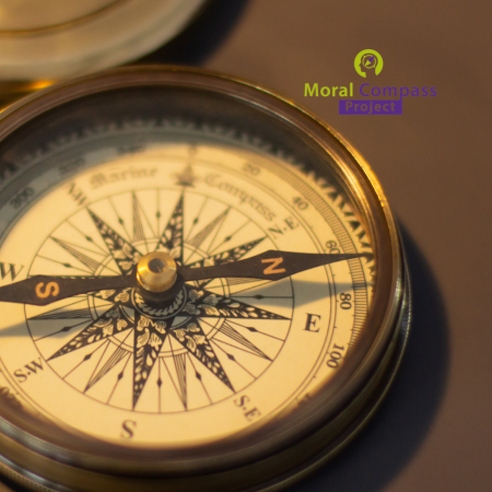- About the project
- Researchers
- Contact
- Subproject: Concern and detachment in moral life
- Subproject: Pantheism and personhood in classical German philosophy
- Subproject: Law and virtue in the Protestant tradition
- Subproject: Spinoza, freedom of speech and the common good
- Subproject: Kierkegaard and transparency thinking
- Subproject: Theological perspectives on meaningful family life
- Subproject: Medical ethics at the end of life
- Subproject: The moral position of family in end of life care for people with dementia
- Subproject: The contribution of military chaplains to moral formation
- Subproject: Law, ethics and polarisation in the Bible and ancient Judaism
About the project
The Moral Compass Project explores how we can think meaningfully today about what is right to do. This is not easy in our time. There seem to be few shared values. Each person gets to decide for themselves what the norm is. And so we quickly think Good (with a capital letter) sounds too absolute. Yet people continue to experience the Good as something that appeals to them inescapably. Moreover, what we mark as good, we see as something that has value not only for ourselves, but also for others. And we also recognize other people's values across cultures. If people are so attracted to the Good, it does not mean that they have an exact grasp of the Good, or can realize it. The Good transcends their concrete actions.
Transcendence of the Good
This project explores ways in which we can bring up the transcendent nature of the Good in science and society. The underlying conviction is that this transcendent moment is essential to morality. Our quest is topical, but not new. Throughout the centuries people have reflected on the transcendent nature of the Good under the heading of the so-called ‘divine law’. By this they meant precisely that dimension of the Good that transcends the concrete, historical situation. Our thinking about the Good always hooks up to that level of the ‘divine’ because we experience the Good as inescapable, and also see it as valuable to the other human beings, or recognize it in the other.
Theological sources
To explore this divine dimension of the Good, the ten studies in this project examine what has been said about it in the history of philosophy and theology. Jewish and Christian sources are central because here law and commandments have continuously played an important role, but always under the critical sign of God's transcendence. In the Protestant traditions, too, there is much attention to this: the Good is not something human beings can achieve on their own, but first and foremost a divine gift. That gift can sometimes appear exclusive, as something to which only God's people have access. But ultimately it is always something universal as well. This is already visible in the biblical eschatological visions in which all the nations gather in Jerusalem to honor God.
Ten subprojects
The research of the Moral Compass Project focuses on three different types of questions and sources in ten subprojects (see numbering below)
- First, we investigate fundamental questions about what the Good is. How can we know and do the Good? In what sense can the Good be simultaneously transcendent and concrete? Historical sources and contemporary thinkers are analysed and compared with an eye to their value for a general theoretical framework. In the process, new questions arise such as how much distance I need to take from my moral beliefs in order to be open to the Good. But also the question of what image of God is implied in the representation of the Good as transcendent. Further, the relationship between knowing the Good and doing it is studied, particularly the role of virtues and habit formation. Related to this is the question of how autonomous human beings are actually still if the Good, and neighbourly love in particular, is a divine gift.
- In historical in-depth studies, the aforementioned fundamental questions are explored in specific sources ranging from ancient texts, to thinkers from Protestant scholasticism, classical German philosophy, as well as Spinoza and Kierkegaard. For example, ancient Jewish and early Christian apocalyptic writings explore how the Good is something that God commands and ultimately realizes, but which at the same time must already be done by humans all the time. Scholastic Protestants are analysed for their view of the relationship between divine law and human virtue. Spinoza receives attention in a project on freedom of expression. His views are rooted in a robust, theologically based view of the common good. Spinoza's pantheism became the subject of debate among classical German philosophers (Jacobi, Fichte and Schelling) centring on the freedom of the individual. Is the individual a free person only if God is also represented personally? This question is also addressed in the project on Kierkegaard where it revolves around the self that arises through ‘divine claim’.
- The value of the notion of the transcendent Good for good coexistence today is examined in a number of concrete moral fields. In families, the appeal to the Good is experienced pre-eminently: family members feel responsible for each other, for example in the event of illness. Research zooms in on shared values in thinking about good end-of-life care and the question of euthanasia. What moral position does family take in that care in the case people with dementia? Other projects pick up more political themes, such as freedom of speech or Big Data technology that should contribute to as much transparency as possible. There is also a focus on contemporary apocalyptic language compared to that of Biblical times. The recently increased threat of war prompts an examination of how the idea of the Good as transcendent can play a role in the moral formation of military personnel.



